It’s Tax Season, What Do You Need To Tackle?

By Jaclyn Quinn, Esq.
Delaware Community Reinvestment Action Council, Inc.
This column usually covers estate planning for your assets after death, but today’s considers life’s other certainty: taxes! With the near-ironclad April 15 deadline for filing (or requesting an extension) looming, it’s time to get your paperwork and payments in order. In the United States, two kinds of taxes readily come to mind: income and property taxes. While income taxes are pretty much universal, property taxes apply to anyone who owns real estate—but both need to be managed correctly, this and every year.
Income taxes get levied by the Internal Revenue Service (IRS), the agency responsible for collecting federal taxes and administering the tax code. The IRS generally considers all money received from all sources to be income—from formal employment to a lemonade stand—unless there is a specific reason for it be exempt, such as business deductions. Income tax returns must be filed annually, by anyone (including minors) who has earned income (above $600), to declare all income received and to confirm that the full amount owed gets paid.
Part of the IRS’s processing of income tax returns is to make sure all sources of income that were reported to the IRS are included in the tax return. The IRS also collects information from payors, so a company with employees will send a W-2 form to both the IRS and to each employee showing what that employee earned. If more taxes were withheld by an employer than the balance owed, the taxpayer receives a refund. If less taxes were withheld than the balance owed, the taxpayer must pay to satisfy their tax liability.
Unpaid taxes will continue to follow an individual until paid in full. The tax code allows penalties and interest to accrue on tax debt, so the sooner any debt is paid, the less expensive it will be. Because not everyone is able to pay in full every April, the IRS does offer installment agreements and other tools to help individuals struggling to pay tax debt. However, the IRS can nonetheless take great measures to collect debt, including garnishing wages, levying bank accounts, and placing a lien on real estate—and it can even collect funds from your estate if you pass away with tax debt.
Property taxes are levied by your city or county and used to fund services like public safety, schools, recreation, and more. Though typically due once a year, most taxing authorities accept year-round payment plans as well. There are some exemptions and relief options available in most places to reduce or remove property tax burdens—for instance, from property owners with permanent disabilities and low incomes, or tax-exempt organizations like charities—but these require additional paperwork to qualify for and receive.
If you own real estate, your land is assessed an annual tax that must be paid; otherwise, the city or county can require certain penalties or interest to be collected on late payments, and your property can even be sold to recover unpaid funds. Property taxes “run” with real estate, meaning that a new owner can inherit an unpaid tax bill alongside a house. If a property is sold, too, any outstanding unpaid taxes will be deducted from the sale proceeds.
All this is why it’s important to confront tax issues as soon as they arise, and to keep potential tax liability in mind throughout the year to avoid surprises during tax season. As much as possible, keep in open communication with the IRS and pay what you can before the due date—even if the balance can’t be paid in full. A qualified tax professional can help, but you still need to get your documents and finances in order to remain in good standing.
If you need legal advice, Jaclyn Quinn and her colleagues at the Delaware Community Reinvestment Action Council are available to assist with tax issues through the Low-Income Tax Clinic, as well as estate planning. For more information, please visit www.dcrac.org. To schedule a consultation, call (302) 298-3251 or email [email protected].
Bio
Jaclyn Quinn, Esq. joined the Delaware Community Reinvestment Action Council (DCRAC) in 2011, first as a volunteer, then as staff. In 2014 Jaclyn opened and grew her private practice until 2019, when DCRAC Law opened to the community. DCRAC Law is a nonprofit law firm providing tax, title, and other legal services to those unable to pay market rates.
Jaclyn graduated with a B.A. in Political Science from The College of New Jersey before moving to Delaware to pursue her J.D. at Widener University- Delaware Law School. She was admitted to the Delaware Bar in 2012, and is also barred in U.S. Tax Court and U.S. Immigration Court. She has volunteered with the Office of the Child Advocate, DVLS, and assists as pro bono counsel in a variety of cases.
Jaclyn Quinn, Esq. Delaware Community Reinvestment Action Council (DCRAC)
302-298-3251 [email protected] www.dcrac.org
@dcracdelcra on instagram & @DCRACDelCRA on facebook
600 South Harrison Street, Wilmington, Delaware
One East Laurel Street, Georgetown, Delaware


